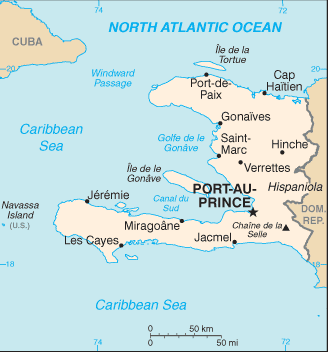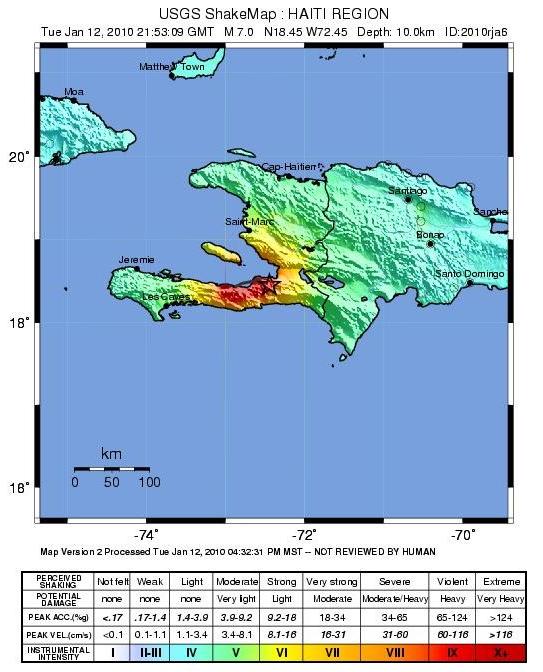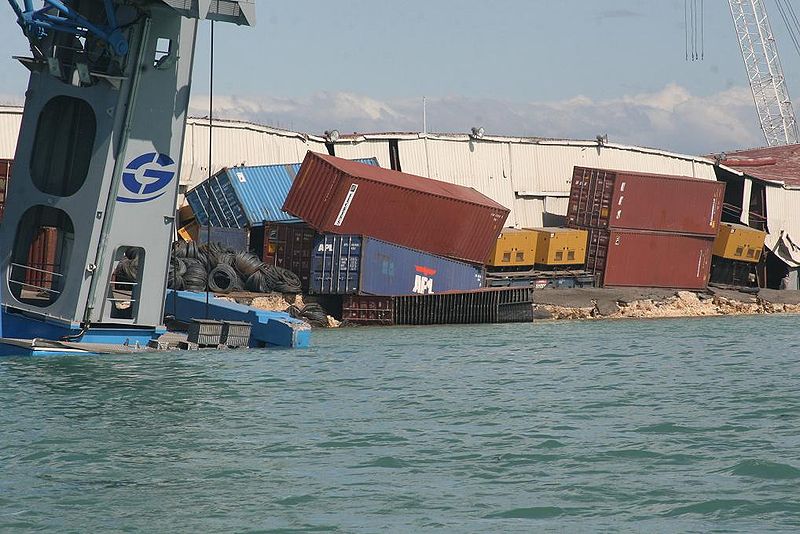The physical and human geography of Haiti is perturbingly relevant at the moment. “On January 12, 2010, at 21:53 UTC (4:53 pm local time), Haiti was struck by a magnitude 7.0 earthquake, the country’s most severe earthquake in over 200 years. The epicenter of the quake was just off the Haitian capital Port-au-Prince, sparking a tsunami watch for parts of the Caribbean, according to the U.S. Geological Survey.
Widespread damage resulted from the quake, with a majority of buildings collapsing due to poor structural design and construction. The capital city was devastated. The Presidential Palace was badly damaged, with the second floor entirely collapsing onto the first floor; the Haitan Parliament building and the National Cathedral were also destroyed. The quake had a reported magnitude of 7.0, with the focus being about 6 miles (10 km) underground, according to the USGS” (Wikipedia). Over 50,000 deaths have been attributed to the recent earthquake, and it is predicted that the death toll will exceed 100,000.
How to donate to Haitian relief efforts:
- The Center for International Disaster Information offers a comprehensive resource page online at
- The Salvation Army is accepting donations online at www.gosalarmy.org, by phone at 1-800-SAL-ARMY or by postal mail at The Salvation Army World Service Office, International Disaster Relief Fund, P.O. Box 630728, Baltimore, MD 21263-0728. Designate donations “Haiti Earthquake.”
- Haiti Emergency Relief Fund is accepting donations online at www.haitiaction.net or mail checks made out to Haiti Emergency Relief Fund/EBSC to East Bay Sanctuary Covenant, 2362 Bancroft Way, Berkeley, CA 94704.
- Interaction, a coalition of U.S.-based international nongovernmental organizations, has a list of agencies responding and how to donate to them. Find it at www.interaction.org/crisis-list/earthquake-Haiti (link no longer exists).
- To donate $10 to the American Red Cross, text Haiti to 90999. The amount will be added to your next phone bill. The organization is also accepting donations through its International Response Fund, www.redcross.org.
- To donate $5 to Wyclef Jean’s Haitian Yele charity, text 501501. The money will be added to your next phone bill.
- To donate $10 to the Clinton Foundation’s Haiti Relief Fund, text “HAITI” to 20222. The amount will be added to your next phone bill. Or go to http://www.clintonfoundation.org/ for more information and a list of organizations accepting donations.
- To find out how to help the International Rescue Committee, visit www.theIRC.org or call toll free, 1-877-REFUGEE.
- To donate through Oxfam’s emergency appeal, visit www.oxfam.org.uk
- Paul Farmer’s Partners in Health is taking donations online at , or send a check with “Haiti Earthquake Relief” in the memo line to Partners In Health, P.O. Box 845578, Boston, MA 02284-5578.
- Additional organizations offering aid in Haiti include Catholic Relief Services, www.crs.org; Jesuit Refugee Service/USA, www.jrsusa.org; and American Jewish World Service, www.ajws.org.
- California Attorney General Jerry Brown recommends donors verify that charities are listed on the state’s Registry of Charitable Trusts. Registration does not guarantee that a charity is effective, but it is an important indicator. A searchable database is available at http://ag.ca.gov/charities.php.
Resources:
The office of Rep. Barbara Lee provides the following information for those seeking information on loved ones in Haiti:
- The U.S. Embassy in Port Au Prince has set up a task force that is taking calls as conditions permit. The Embassy is working to identify U.S. citizens in Haiti who need assistance and sources of emergency help.
- U.S. citizens should e-mail the embassy at acspap@state.gov. U.S. citizens in Haiti can call the Embassy”s Consular Task Force at 509-2229-8942, 509-2229-8089, 509-2229-8322, or 509-2229-8672.
- The State Department has also created a task force to monitor the emergency. Those with information or inquiries about U.S. citizens in Haiti may reach the Haiti Task Force at 888-407-4747 or ca-taskforce@state.gov. Outside of the U.S. and Canada, call 202-501-4444.
- For further information and updates, go to the State Department”s Consular Affairs Web site at www.travel.state.gov/.
- Haitian citizens in the U.S. should call the Haitian Embassy in Washington, D.C., 202-332-4090, or the Haitian Consulate in New York City, 305-859-2003.
Editor’s note: Most of the above was taken from Wikipedia, the Santa Cruz Sentinel, and MercuryNews.com

.png)





